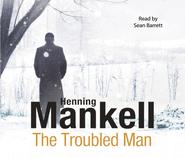По всем вопросам обращайтесь на: info@litportal.ru
(©) 2003-2024.
✖
Roseanna
Автор
Год написания книги
2019
Настройки чтения
Размер шрифта
Высота строк
Поля
The number of people behind the police barricade on the abutment had increased tenfold. On the other side of the canal there were several cars, four of which belonged to the police, and a white-painted ambulance with red crosses on the back doors. Two men in white overalls leaned against a fender smoking. They seemed to be the only people who weren't interested in the group out by the harbour light.
On the breakwater the doctor began to gather his things together. He chatted with the Superintendent who was a tall, grey-haired man named Larsson.
‘There isn't much I can say about it now,’ said the doctor.
‘Does she have to remain lying here?’ Larsson asked.
‘Isn't that more your business?’ replied the doctor.
‘This is hardly the scene of the crime.’
‘Okay,’ the doctor agreed. ‘See that they drive her to the mortuary. I'll telephone ahead.’
He shut his bag and left.
The Superintendent turned and called, ‘Ahlberg, you're going to keep the area blocked off, aren't you?’
‘Yes, damn it.’
The Commissioner of Police hadn't said anything out by the harbour light. He didn't usually enter investigations in the early stages. But on the way into town, he said: ‘You'll keep me informed.’
Larsson didn't even bother to nod.
‘You'll keep Ahlberg on it?’
‘Ahlberg's a good man,’ said the Superintendent.
‘Yes, of course.’
The conversation ended. They arrived, left the car and went into their separate offices. The Commissioner placed a telephone call to the County Authority in Linköping who merely said: ‘I'll be waiting to hear from you.’
The Superintendent had a short conversation with Ahlberg. ‘We have to find out who she is.’
‘Yes,’ said Ahlberg.
He went into his office, called the Fire Department and requisitioned two frogmen. Then he read through a report on a burglary in the harbour. That one would be cleared up soon. Ahlberg got up and went to the officer on duty.
‘Is there anyone reported missing?’
‘No.’
‘No notification of missing persons?’
‘None that fit.’
He went back to his office and waited.
The call came after fifteen minutes.
‘We have to ask for an autopsy,’ said the doctor.
‘Was she strangled?’
‘I think so.’
‘Raped?’
‘I think so.’
The doctor paused a second. Then he said: ‘And pretty methodically, too.’
Ahlberg bit on his index fingernail. He thought of his vacation which was to begin on Friday and how happy his wife was about it.
The doctor misinterpreted the silence.
‘Are you surprised?’
‘No,’ said Ahlberg.
He hung up and went into Larsson's office. Then they went to the Commissioner's office together.
Ten minutes later the Commissioner asked for a medico-legal post-mortem examination from the County Administrator who contacted the Government Institute for Forensic Medicine. The autopsy was conducted by a seventy-year-old professor. He came on the night train from Stockholm and seemed bright and cheerful. He conducted the autopsy in eight hours, almost without a break.
Then he left a preliminary report with the following wording: ‘Death by strangulation in conjunction with gross sexual assault. Severe inner bleeding.’
By that time the records of the inquiry and reports had already begun to accumulate on Ahlberg's desk. They could be summed up in one sentence: a dead woman had been found in the lock chamber at Borenshult.
No one had been reported missing in the city or in neighbouring police districts. There was no description of any such missing person.
3 (#u9c18454e-0e56-5b0c-af24-b584e1900a74)
It was a quarter past five in the morning and it was raining. Martin Beck took more time brushing his teeth than usual to get rid of the taste of lead in his mouth.
He buttoned his collar, tied his tie and looked listlessly at his face in the mirror. He shrugged his shoulders and went out into the hall, continued on through the living room, glanced longingly at the half-finished model of the training ship, Danmark, on which he had worked until the late hours the night before, and went into the kitchen.
He moved quietly and softly, partly from habit and partly not to wake the children.
He sat down at the kitchen table.
‘Hasn't the newspaper come yet?’ he said.
‘It never comes before six,’ his wife answered.
It was completely light outside but overcast. The daylight in the kitchen was grey and soupy. His wife hadn't turned on the lights. She called that saving.
He opened his mouth but closed it again without saying anything. There would only be an argument and this wasn't the moment for it. Instead he drummed slowly with his fingers on the formica table top. He looked at the empty cup with its blue rose pattern and a chip in the rim and a brown crack down from the notch. That cup had hung on for almost the duration of their marriage. More than ten years. She rarely broke anything, in any case not irreparably. The odd part of it was that the children were the same.
Could such qualities be inherited? He didn't know.






